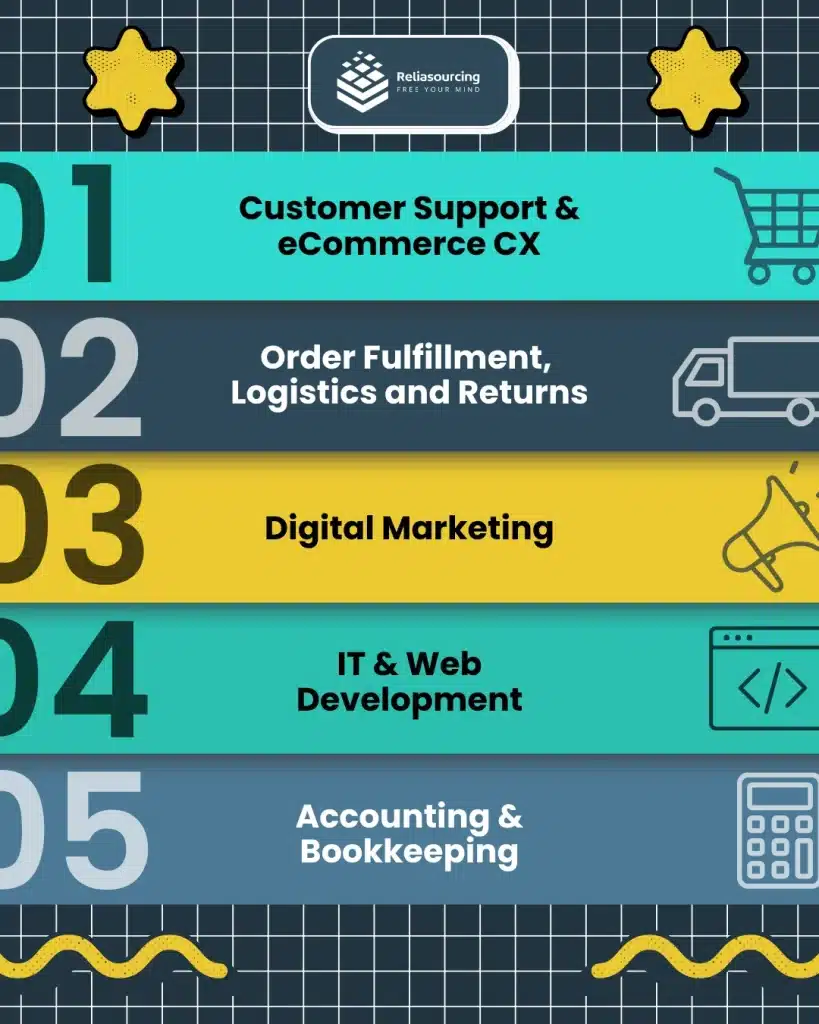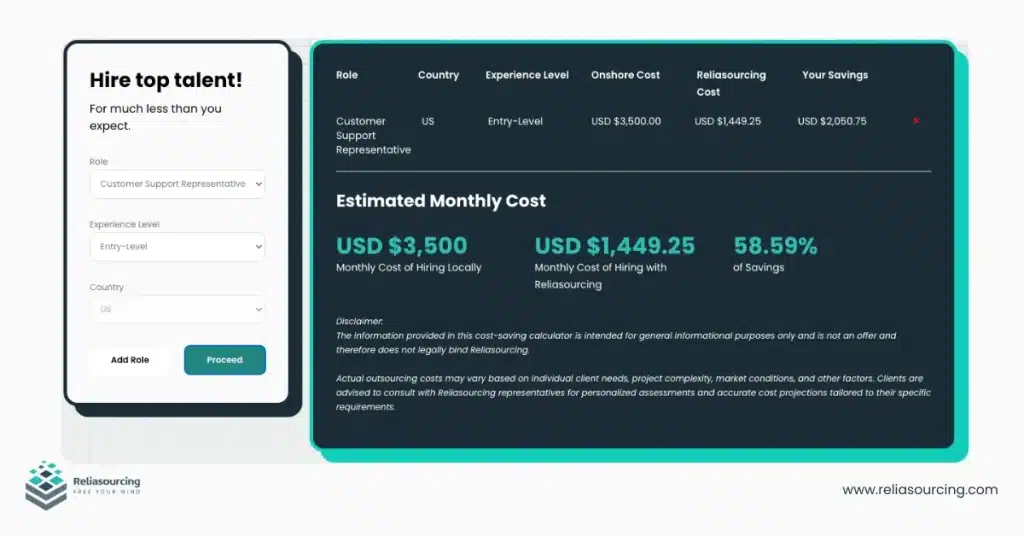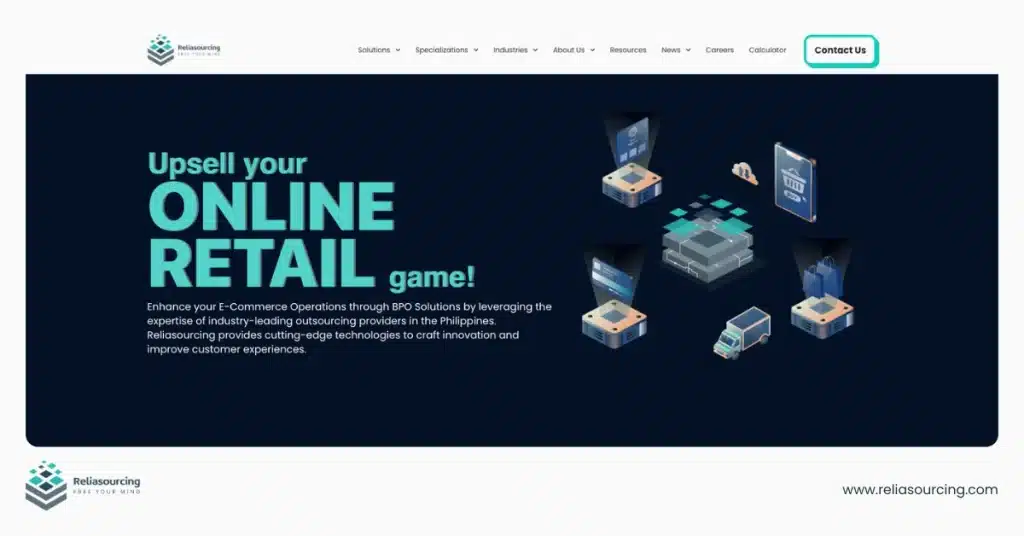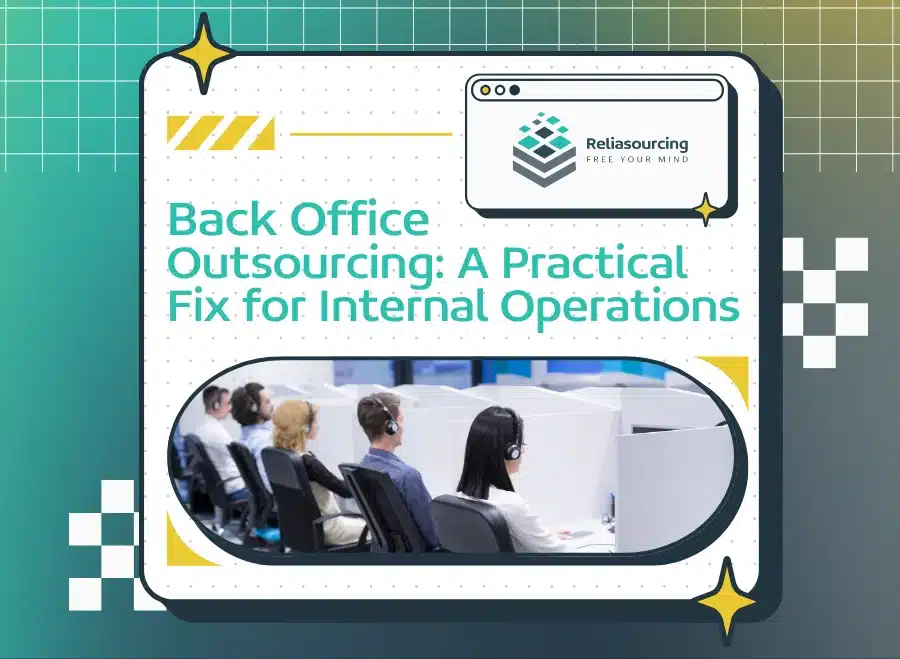The eCommerce industry has reached a point where growth depends on more than just having the right product and an online storefront. Businesses face increasing pressure to deliver seamless customer experiences, maintain efficient operations, and compete with local startups and global enterprises. And as competition rises, so does the demand for specialized talent in areas like digital marketing, logistics, and customer service.
Building these functions in-house is costly and time-consuming for many companies, so outsourcing has become a proven strategy to scale smarter, offering cost savings, agility, and access to skilled professionals. The Philippines, in particular, has emerged as the global leader in eCommerce outsourcing. With a highly skilled workforce, strong English proficiency, and a culture of customer service excellence, the country has become the go-to destination for businesses looking to streamline operations while maintaining quality.
Outsourcing key eCommerce roles opens the opportunity for startups and established enterprises to reduce overhead, expand capacity, and focus on strategic growth. So instead of overextending internal resources, companies can access talent on demand, building resilience and flexibility into their operations. In this article, we’ll explore the top eCommerce roles to outsource, compare onsite hiring costs with outsourcing to the Philippines, address common questions and risks, and show how Reliasourcing supports eCommerce businesses in scaling smarter.
Key Ecommerce Roles to Outsource

Scaling an eCommerce business requires balancing customer experience with backend efficiency. Outsourcing specific roles allows you to achieve both without overstretching your internal team. Below are the most impactful eCommerce roles to outsource.
1. Customer Support & eCommerce CX
Customer experience (CX) is often the deciding factor in whether a shopper makes a repeat purchase. Outsourcing customer service ensures timely responses across multiple channels: email, chat, phone, and social media. Skilled agents know how to manage order inquiries, handle returns, and resolve complaints with empathy and brand alignment.
For instance, a mid-sized fashion eCommerce brand may experience a flood of queries during seasonal sales. Instead of hiring and training dozens of temporary staff, outsourcing steps in to instantly expand support capacity. Seasonal demand spikes, like holiday shopping or major sales events, are precisely where outsourced teams provide the flexibility to scale headcount quickly without long-term contracts. Many online retailers rely on eCommerce customer service outsourcing to manage order spikes during these sales events, ensuring customers always receive timely support.
And don’t worry about the quality of service; outsourcing teams often provide insights on how to improve customer service, helping brands move beyond issue resolution to building lasting customer loyalty.
Outsourced customer support roles may include:
- Customer service representatives (voice, chat, and email)
- Help desk and technical support agents
- Social media support specialists
- Customer experience managers / QA specialists
2. Order Fulfillment, Logistics, and Returns
Outsourcing logistics and returns management gives companies access to established infrastructure and processes that would be costly to replicate in-house. Third-party providers can manage warehousing, inventory updates, last-mile delivery coordination, and return handling, ensuring smooth fulfillment, central to customer satisfaction.
Consider a small electronics retailer that wants to expand internationally. Handling customs, shipping, and return logistics in-house would be overwhelming. An outsourcing partner can handle these complexities seamlessly, all while making sure customers in different regions enjoy the same reliable delivery experience.
For growing eCommerce businesses, outsourcing fulfillment reduces the risk of delayed shipments and ensures a reliable supply chain. More importantly, it allows founders and managers to focus on growth strategies rather than day-to-day operational bottlenecks.
Outsourced logistics and fulfillment roles may include:
- Warehouse associates (through third-party logistics providers)
- Inventory management specialists
- Shipping and delivery coordinators
- Returns and reverse logistics staff
3. Digital Marketing
Visibility is everything in online retail. Outsourcing digital marketing roles such as SEO, PPC advertising, content marketing, and social media management allows businesses to access specialized expertise. The approach eliminates the need to hire a large internal team.
Outsourced SEO teams can optimize product listings to improve rankings, while PPC specialists can fine-tune campaigns to reduce cost per acquisition. Moreover, outsourced content teams bring fresh ideas for blogs and campaigns that boost engagement. And Outsource Accelerator even shares that outsourcing achieves a 231% higher ROI than in-house at 60% due to access to broader skill sets and tools.
Outsourced experts stay updated on changing algorithms and trends in digital marketing. Though this, your campaigns remain agile and effective.
Outsourced digital marketing roles may include:
- SEO specialists
- Paid ads / PPC managers
- Content writers and editors
- Social media managers
- Email marketing specialists
- Graphic designers and video editors
4. IT & Web Development
A seamless online shopping experience relies on a strong IT infrastructure. Outsourced developers can manage tasks like site optimization, payment gateway integrations, and cybersecurity protocols. With the rapid evolution of eCommerce platforms, having outsourced IT support keeps your business agile and responsive to customer needs.
Startups especially benefit from outsourced IT, as they gain access to enterprise-level expertise without paying full-time developer salaries. For established enterprises, outsourcing IT roles provides additional bandwidth to support large-scale platform migrations, mobile app development, or advanced data analytics integrations.
Outsourced IT and development roles may include:
- Web developers (front-end, back-end, full-stack)
- ECommerce platform specialists (Shopify, Magento, WooCommerce)
- Mobile app developers
- Cybersecurity analysts
- Systems administrators
5. Accounting & Bookkeeping
Financial management often gets overlooked in fast-growing businesses. Outsourcing accounting and bookkeeping ensures accuracy in tax compliance, payroll, and reporting, and experienced outsourced teams provide insights into cash flow management, helping companies make smarter financial decisions.
Outsourcing payroll processing can help ensure employees are paid accurately and on time. This is especially beneficial when managing payroll across multiple regions, as it prevents adding to the HR burden on the internal team. Through this, compliance risks are reduced, helping maintain employee satisfaction and trust.
Having these roles outsourced grants businesses the opportunity to ensure transparency, reduce compliance risks, and free up leadership to focus on growth rather than administrative detail.
Outsourced finance roles may include:
- Bookkeepers
- Accounts payable/receivable clerks
- Payroll specialists
- Financial analysts
- Tax compliance specialists
Pricing: Onsite Hiring vs Outsourcing to the Philippines
The significant cost advantage is one of the most compelling reasons businesses outsource to the Philippines.
In the United States, the average salary for a customer service representative is around $68,999 annually, with the lowest being $36,366. And this doesn’t even include benefits, office space, training, and technology. In Europe, salaries range even higher depending on the country. Compare this to outsourced teams in the Philippines, where costs can be reduced by as much as 70% without sacrificing quality.
To illustrate:
- US-based Customer Service Rep
~$36,366 salary + ~$10,000 in benefits and overhead = ~$46,366 per year. - Philippines Outsourced Agent (Reliasourcing Estimates)
$17,391 annually, including benefits, infrastructure, and management.
That’s an annual savings of almost $30,000 per role, which compounds significantly for companies managing larger teams. To get better estimates, feel free to use Reliasourcing’s calculator to build your own team.

Beyond wages, businesses save on overhead expenses like recruitment, software licensing, and infrastructure since outsourcing partners absorb these costs, delivering an all-inclusive package that allows companies to allocate more resources to sales, product development, or marketing. For many companies, however, outsourcing isn’t limited to labor savings. The model becomes part of a broader business process outsourcing strategy that ties together customer service, logistics, and back-office functions for maximum efficiency.
Seasonal staffing flexibility is another key differentiator since many eCommerce businesses experience sharp demand fluctuations during holiday sales, Black Friday, or special promotions. Hiring, training, and managing short-term staff internally is expensive and inefficient, so outsourcing providers like Reliasourcing offer scalable seasonal staffing, enabling businesses to expand their workforce rapidly during peak periods and contract once demand normalizes, without penalties or long-term lock-ins.
FAQs on eCommerce Outsourcing
Which eCommerce roles can be outsourced?
Which eCommerce roles can be outsourced depends on the business’s needs, but the most common include customer support, order fulfillment and returns, logistics coordination, digital marketing, IT and web development, and finance functions like bookkeeping, roles that are the easiest to scale externally while maintaining efficiency and quality.
How does outsourcing benefit online retail companies?
Outsourcing benefits online retail companies by giving them the flexibility to scale quickly, save on overhead costs, and access specialized expertise. For eCommerce brands, this often translates into faster order processing, improved customer satisfaction, and more resources to focus on growth strategies.
Is outsourcing cost-effective for SMEs?
Yes. Outsourcing is cost-effective for SMEs because it allows them to access professional talent and infrastructure at a fraction of the cost of hiring full in-house teams, making it one of the most efficient ways to scale without overextending budgets.
What risks should I consider when outsourcing?
The risks to consider when outsourcing include misalignment of communication, quality inconsistency, and lack of control if providers aren’t carefully selected. To mitigate these risks, choose a trusted outsourcing partner with a strong track record, clear service-level agreements (SLAs), and transparent reporting processes. When evaluating risks, it also helps to understand why companies outsource work, since the right partner can turn potential risks into long-term strategic advantages.
How Reliasourcing Supports eCommerce Companies
Reliasourcing has built a reputation for providing tailored outsourcing solutions to eCommerce companies of all sizes. From customer service outsourcing to full-scale operational support, the company offers flexible staffing models that adapt to seasonal demand, making sure businesses can thrive during peak periods without long-term overhead.
With no minimum headcount requirements, Reliasourcing empowers both startups and established retailers to scale on their own terms. Clients benefit from cost efficiency, strong operational processes, and access to specialized talent trained specifically for eCommerce functions.
For businesses looking to scale smarter, Reliasourcing provides manpower that delivers expertise, infrastructure, and the agility needed to compete in the fast-moving landscape of online retail.

Explore how outsourcing can accelerate your growth by connecting with Reliasourcing. Contact us today!
Conclusion: Leveraging Outsourced eCommerce Roles
Outsourcing is a growth strategy, and by outsourcing essential eCommerce roles such as customer service, logistics, marketing, IT, and accounting, businesses can unlock scalability, improve efficiency, and focus resources on innovation.
For startups, outsourcing levels the playing field against larger competitors. For enterprises, it provides the agility to meet customer expectations at scale. Partnering with an outsourcing provider like Reliasourcing ensures that your business keeps pace with market demands and thrives in a competitive environment.
Looking ahead, eCommerce will only become more competitive, and businesses that build flexibility into their operating models will scale sustainably. Outsourcing offers that flexibility, whether through business process outsourcing, specialized CX solutions, or seasonal staffing strategies tailored for growth.
Scaling smarter starts with the right partners. Reliasourcing is here to help you turn outsourcing into an opportunity for growth.









